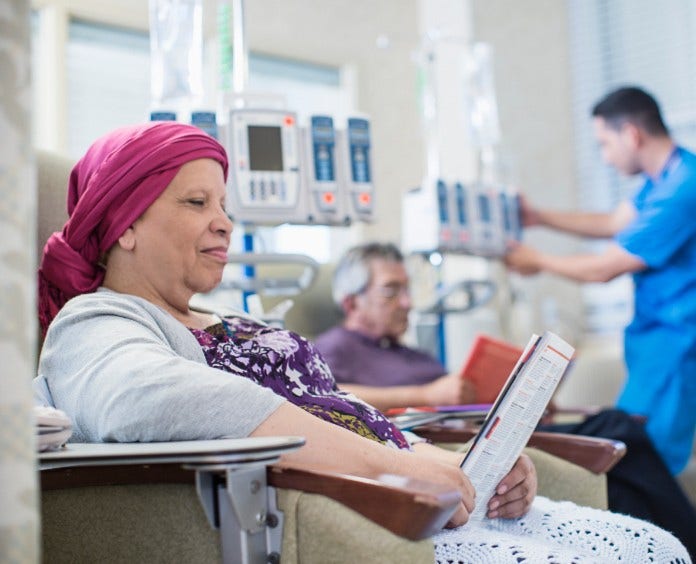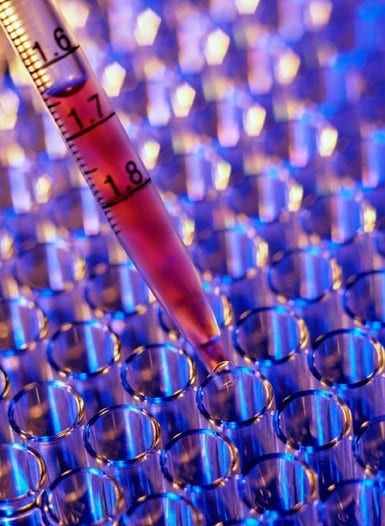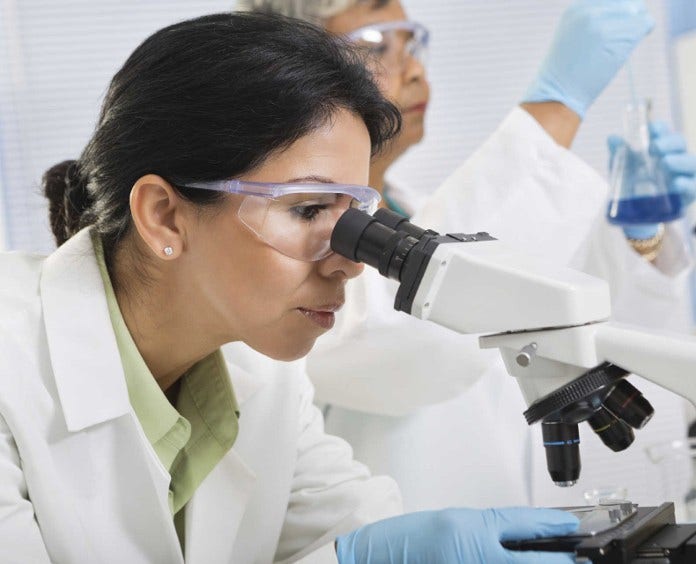Your gift is 100% tax deductible.
Breast Cancer in Men
If you have breast cancer or are close to someone who does, knowing what to expect can help you cope. Here you can find out all about breast cancer in men, including risk factors, symptoms, how it is found, and how it is treated.
(For information on breast cancer in women see Breast Cancer.)
About Breast Cancer in Men
Breast cancer occurs mainly in women, but men can get it, too. Many people do not realize that men have breast tissue and that they can develop breast cancer.
Breast cancer starts when cells in the breast begin to grow out of control. These cells usually form a tumor that can often be seen on an x-ray or felt as a lump. If the cancer isn’t treated, the cancer cells can grow into (invade) surrounding tissues or spread (metastasize) to other areas of the body.
To learn more about how cancers start and spread, see What Is Cancer?
Male breast tissue
Before puberty, young boys and girls have a small amount of breast tissue consisting mainly of a few ducts (tube-like structures) located under the nipple and areola (area around the nipple).
At puberty, a girl's ovaries start making more female hormones, causing breast ducts to grow and lobules to form at the ends of the ducts. Lobules are small glands where breast milk is made.
Even after puberty, boys and men normally have low levels of female hormones, so their breast tissue doesn’t grow much. Men's breast tissue has ducts, but very few, if any, lobules.
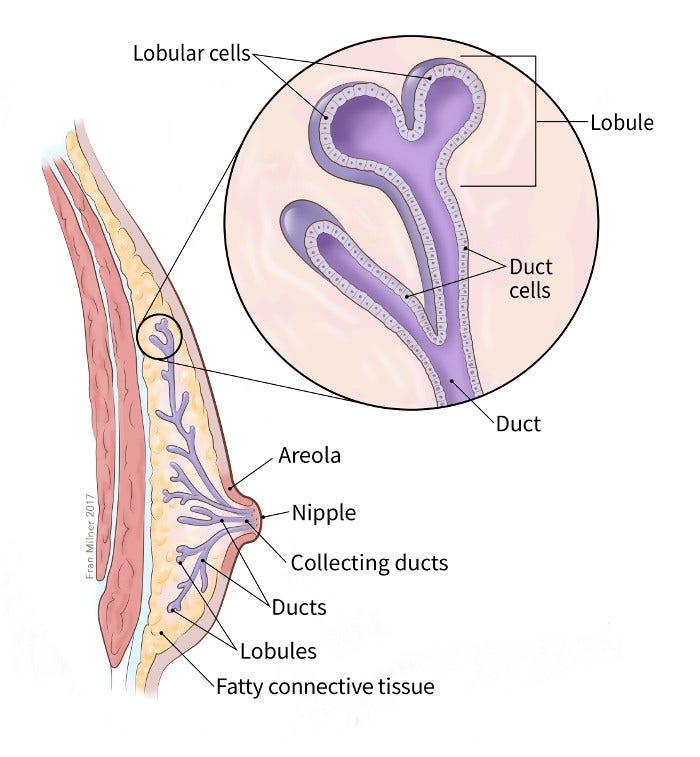
Where breast cancer starts
Breast cancer in men can start in different parts of the breast:
- Most breast cancers in men begin in the cells that line the ducts. These are called ductal cancers or ductal carcinomas.
- A very small number start in cells in lobules (lobular cancers or lobular carcinomas).
- An even smaller number start in other tissues in the breast. These include sarcomas and lymphomas.
For more on the different types of breast cancer, see “Types of breast cancer in men,” below.
How breast cancer grows and spreads
As cancer cells grow, they form a tumor, which can usually be felt as a lump in the breast tissue under the skin. If the cancer isn’t treated, over time it can grow into nearby structures such as the skin itself or the muscles and other tissues underneath the breast.
Breast cancer can spread when the cancer cells get into the blood or lymph system and are carried to other parts of the body.
The lymph system is a network of lymph nodes (small, bean-sized collections of immune cells) connected by tiny vessels throughout the body. Lymph vessels are like small veins, except that they carry a clear fluid called lymph (instead of blood) away from the breast.
When breast cancer spreads, it typically goes to the nearby lymph nodes first. These include:
- Lymph nodes under the arm (axillary lymph nodes)
- Lymph nodes around the collarbone (supraclavicular [above the collarbone] and infraclavicular [below the collarbone] lymph nodes)
Lymph nodes inside the chest near the breastbone (internal mammary lymph nodes)
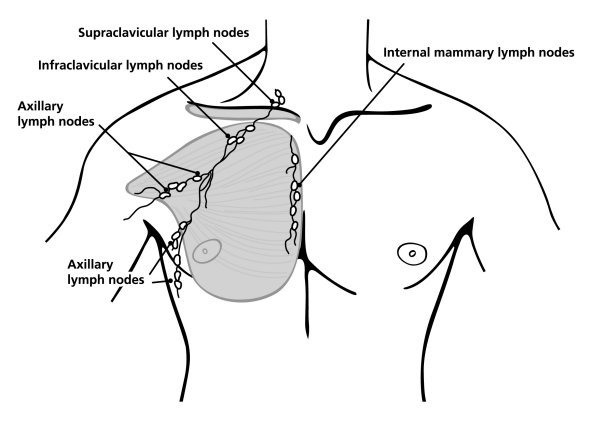
If the cancer cells have spread to your lymph nodes, there is a higher chance that the cells could have also spread (metastasized) to other parts of your body.
Breast cancer can also spread through the bloodstream to reach other parts of the body, where it may form new tumors.
Types of breast cancer in men
Most breast cancers are carcinomas. Most often, they are a type of carcinoma called adenocarcinoma, which starts in cells that make up glands (glandular tissue). Breast adenocarcinomas can start in the ducts (the milk ducts) or the lobules (milk-producing glands). Even though men don’t make breast milk, they still have these tissues.
The name of the breast cancer type can also depend on the extent of the cancer.
- In situ breast cancers are still just in the layer of breast tissue they started in and have not grown any deeper (or spread).
- Invasive or infiltrating cancers have invaded into deeper layers of the breast tissue.
DCIS (also known as intraductal carcinoma) is considered non-invasive or pre-invasive breast cancer.
In DCIS, cells that line the ducts have changed to look like cancer cells. But the cells have not spread (invaded) through the walls of the ducts into the surrounding tissue of the breast or spread outside the breast.
DCIS is considered a pre-cancer because sometimes it can go on to become an invasive cancer. But there is no sure way to know which ones will and which ones won’t.
DCIS accounts for about 1 in 10 cases of breast cancer in men. It is almost always curable with surgery.
Invasive (or infiltrating) ductal carcinoma (IDC) starts in duct cells in the breast and invades into deeper layers of breast tissue. It can also spread to other parts of the body through the lymph system or bloodstream.
This is by far the most common type of breast cancer in men. At least 8 out of 10 male breast cancers are IDCs.
Because the male breast is much smaller than the female breast, all male breast cancers start relatively close to the nipple, so they are more likely to spread to the nipple.
Special subtypes of IDC
There are some special subtypes of IDC. These are often named after features of the cancer cells, like the ways the cells are arranged. They are much less common than standard IDC.
Some of these tend to have a better outlook (prognosis) than standard IDC:
- Adenoid cystic (or adenocystic) carcinoma
- Low-grade adenosquamous carcinoma (a type of metaplastic carcinoma)
- Medullary carcinoma
- Mucinous (or colloid) carcinoma
- Papillary carcinoma
- Tubular carcinoma
Some subtypes have the same or possibly a worse prognosis than IDC:
- Metaplastic carcinoma (including spindle cell and squamous, except for low-grade adenosquamous carcinoma)
- Micropapillary carcinoma
- Mixed carcinoma (has features of both IDC and ILC)
In general, all of these subtypes are still treated like standard IDC.
Invasive lobular carcinoma (ILC) starts in the cells lining the lobules. Like IDC, it invades into deeper layers of breast tissue and can spread to other parts of the breast and body.
ILC is rare in men. This is because men do not usually have much (if any) lobular breast tissue.
This type of breast cancer starts in the breast duct and spreads to the nipple. It may also spread to the areola (the dark circle around the nipple).
The skin of the nipple often looks crusted, scaly, and red, with areas of itching, oozing, burning, or bleeding. There may also be an underlying lump.
Paget disease is often found along with either DCIS or infiltrating ductal carcinoma.
This type of breast cancer is rare in both men and women.
Inflammatory breast cancer is a fast-growing but rare type of invasive ductal carcinoma in which the cancer cells block up the lymph vessels. This can make the breast swollen, red, warm, and tender rather than forming a lump. It can be mistaken for an infection in the breast tissue.
This type of breast cancer is very rare in men.
Benign breast conditions
Most breast lumps in men are benign (not cancer). Benign breast conditions are abnormal areas of growth, but they don’t spread outside of the breast and are not life-threatening.
Still, it’s important to have any breast lump checked by a health care provider to determine if it’s benign or malignant (cancer).
Gynecomastia is the most common male breast disorder. It is not a tumor but rather an increase in the amount of a man's breast tissue.
Usually, men have too little breast tissue to be felt or noticed. Gynecomastia can appear as a button-like or disk-like growth under the nipple and areola (the darker circle around the nipple), which can be felt and sometimes seen. Some men have more severe gynecomastia and they may appear to have small breasts.
Although gynecomastia is much more common than breast cancer in men, both can be felt as a growth under the nipple, so it's important to have any such lumps checked by your doctor.
Causes of gynecomastia
Men's glands normally make some estrogen (the main female hormone), but not enough to cause breast growth.
Gynecomastia is common among teenage boys because the balance of hormones in the body changes during adolescence. It is also common in older men due to changes in their hormone balance.
Other causes of gynecomastia include:
- Tumors or diseases of certain endocrine (hormone-producing) glands, which can cause the body to make more estrogen.
- Liver disease, which can affect hormone metabolism and change the balance of hormones.
- Having excess body weight, which can lead to higher estrogen levels.
- Certain medicines, including some used to treat ulcers and heartburn, high blood pressure, heart failure, and psychiatric conditions. If you have gynecomastia, ask your doctor if any medicines you are taking might be causing it.
- Klinefelter syndrome, a rare genetic condition that can cause gynecomastia as well as increase a man's risk of developing breast cancer.
There are many types of benign breast tumors (abnormal lumps or masses of tissue), such as papillomas and fibroadenomas. Benign tumors do not spread outside the breast and are not life-threatening.
Benign breast tumors are common in women but are very rare in men.
Quick Guides
- Written by
- References

Developed by the American Cancer Society medical and editorial content team with medical review and contribution by the American Society of Clinical Oncology (ASCO).
Gradishar WJ, Ruddy KJ. Breast cancer in men. UpToDate. 2025. Accessed at https://www.uptodate.com/contents/breast-cancer-in-men on July 16, 2025.
National Cancer Institute. Male Breast Cancer Treatment (PDQ®)–Patient Version. 2024. Accessed at https://www.cancer.gov/types/breast/patient/male-breast-treatment-pdq on July 16, 2025.
Zheng G, Leone JP. Male breast cancer: An updated review of epidemiology, clinicopathology, and treatment. J Oncol. 2022 May 24;2022:1734049.
Last Revised: October 15, 2025
American Cancer Society medical information is copyrighted material. For reprint requests, please see our Content Usage Policy.
This information is possible thanks to people like you.
We depend on donations to keep our cancer information available for the people who need it most.


